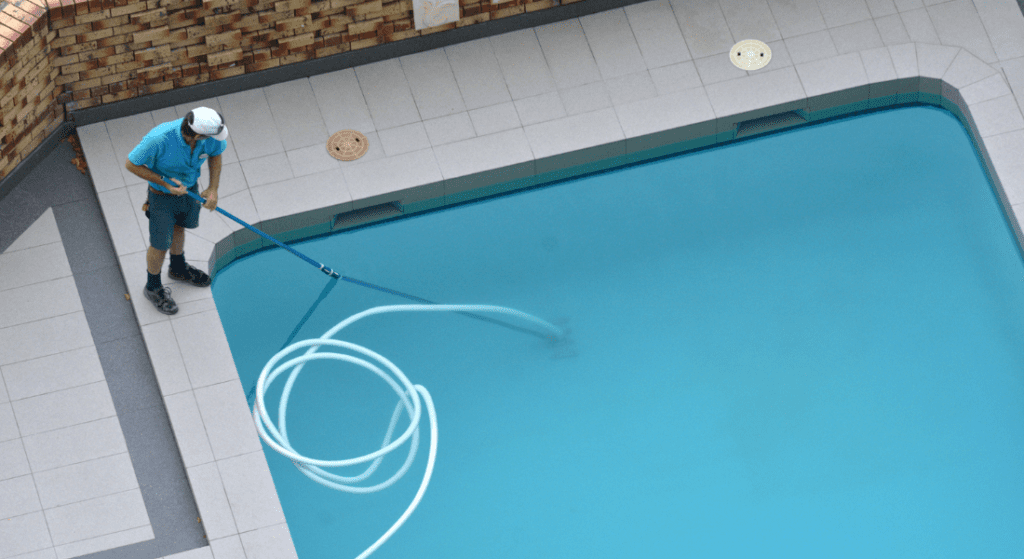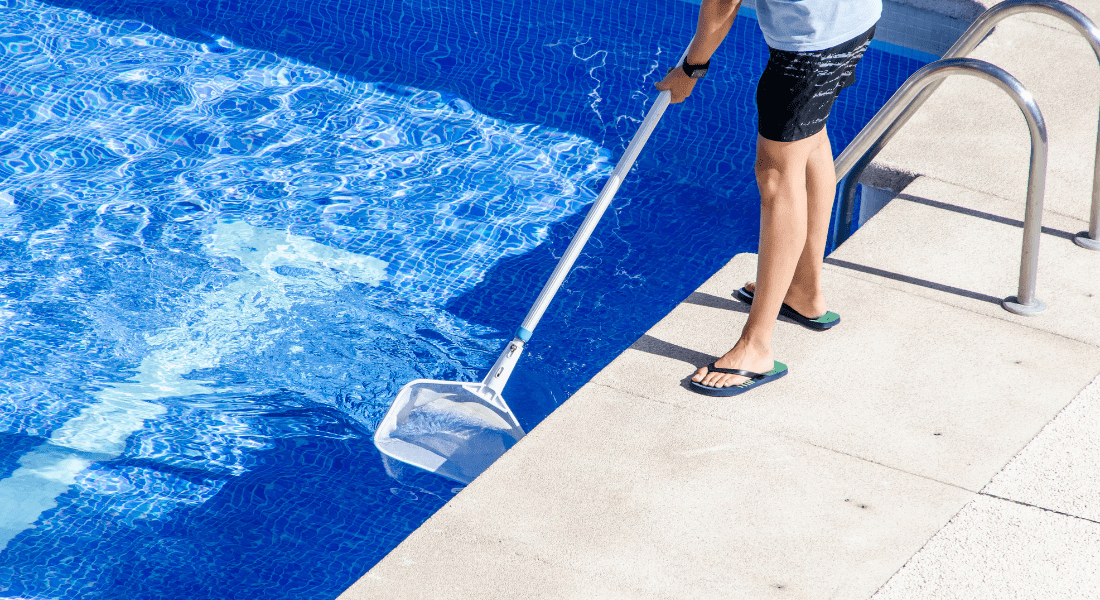Having a clean and well-maintained swimming pool is essential for any pool owner. Unfortunately, maintaining a pool is not always easy, and many pool owners struggle to keep their pools in top condition. This can lead to cloudy water, algae growth, and costly repairs.
In this comprehensive guide, we’ll cover everything you need to know about professional pool cleaning services, why they’re important, how they work, and tips for choosing the best service provider. Whether you’re a new pool owner or looking to improve your pool maintenance routine, this article is packed with valuable insights to help you keep your pool sparkling clean.
Why Professional Pool Cleaning Services Are Essential
Maintaining a swimming pool involves more than just skimming leaves off the surface. Professional pool cleaning services ensure your pool is clean, safe, and ready for a swim at any time. These services are essential because they offer expertise and specialized equipment to handle tasks that are difficult for the average pool owner.
Professional pool cleaners are trained to identify and address potential problems before they escalate. They understand the balance of pool chemicals, how to clean the pool filter, and how to keep your pool’s equipment in top condition. This proactive approach can save you money on costly repairs and ensure your pool remains a safe place for swimming.
Additionally, hiring a professional pool cleaning service saves you time and effort. Instead of spending your weekends maintaining the pool, you can relax and enjoy your backyard oasis.
What To Expect From A Professional Pool Cleaning Service
When you hire a professional pool cleaning service, you can expect a thorough and comprehensive cleaning of your pool. This typically includes:
- Skimming the surface to remove debris such as leaves and insects.
- Brushing the pool walls and tiles to prevent algae buildup.
- Vacuuming the pool floor to eliminate dirt and debris.
- Cleaning the pool filter to ensure optimal filtration.
- Testing and balancing the pool water’s chemical levels, including pH, chlorine, and alkalinity.
- Inspecting the pool pump, heater, and other equipment for any signs of wear or damage.
Professional pool cleaners also provide detailed reports on the condition of your pool and recommend any necessary repairs or maintenance.
How Often Should You Schedule Pool Cleaning Services?
The frequency of pool cleaning services depends on several factors, including the pool’s location, usage, and the surrounding environment. Generally, it’s recommended to clean your pool at least once a week to maintain water quality and safety.
For pools located in areas with heavy foliage or frequent use, more frequent cleanings may be necessary. Additionally, seasonal changes can affect how often you need pool cleaning services. For instance, during the fall when leaves are falling, you might need to increase the cleaning frequency.
Regular maintenance not only keeps your pool clean but also extends the lifespan of your pool equipment and surfaces.
How Often Should You Schedule Pool Cleaning Services?
The frequency of pool cleaning services depends on several factors, including the pool’s location, usage, and the surrounding environment. Generally, it’s recommended to clean your pool at least once a week to maintain water quality and safety.
For pools located in areas with heavy foliage or frequent use, more frequent cleanings may be necessary. Additionally, seasonal changes can affect how often you need pool cleaning services. For instance, during the fall when leaves are falling, you might need to increase the cleaning frequency.
Regular maintenance not only keeps your pool clean but also extends the lifespan of your pool equipment and surfaces.
What Are The Benefits Of Regular Pool Maintenance?
Regular pool maintenance offers numerous benefits, including:
- Improved Water Quality: Regular cleaning and chemical balancing ensure that the water is safe and pleasant for swimming.
- Increased Lifespan of Pool Equipment: Keeping the pool pump, filter, and other equipment clean and well-maintained prevents breakdowns and extends their lifespan.
- Cost Savings: Preventive maintenance helps avoid costly repairs and replacements.
- Enhanced Aesthetic Appeal: A well-maintained pool looks inviting and enhances the overall appeal of your backyard.
Regular pool maintenance also helps in identifying potential issues early, allowing for timely repairs and preventing more significant problems down the line.
Choosing The Best Pool Cleaning Service Near You
When selecting a pool cleaning service, consider the following factors to ensure you choose the best provider:
- Reputation: Look for reviews and testimonials from previous customers. A reputable pool cleaning service will have positive feedback and a good track record.
- Experience: Choose a service with experienced technicians who are knowledgeable about different pool types and maintenance needs.
- Services Offered: Ensure the company offers comprehensive pool cleaning and maintenance services, including chemical balancing, equipment inspection, and repair.
- Pricing: Get quotes from multiple service providers to compare pricing and services. Be wary of extremely low prices, as they may indicate subpar service.
- Customer Service: A reliable pool cleaning service should provide excellent customer service, promptly addressing any concerns or issues.
By considering these factors, you can find a trustworthy and professional pool cleaning service that meets your needs.

What Does Weekly Pool Maintenance Include?
Weekly pool maintenance is essential for keeping your pool in top condition. A typical weekly service includes:
- Skimming and Cleaning: Removing debris from the surface and cleaning the pool walls, tiles, and floor.
- Chemical Testing and Balancing: Testing the water for pH, chlorine, and alkalinity levels and adjusting them as needed.
- Filter Cleaning: Cleaning or backwashing the pool filter to ensure proper filtration.
- Equipment Inspection: Checking the pool pump, heater, and other equipment for any signs of wear or malfunction.
Regular weekly maintenance helps prevent algae buildup, keeps the water clear, and ensures that the pool equipment functions efficiently.
Understanding Pool Filter Cleaning And Maintenance
The pool filter plays a crucial role in keeping your pool water clean and clear. There are three main types of pool filters: sand, cartridge, and diatomaceous earth (DE). Each type requires different maintenance procedures:
- Sand Filters: These filters need to be backwashed regularly to remove trapped dirt and debris. Sand should be replaced every 5-7 years.
- Cartridge Filters: These filters need to be cleaned by removing the cartridge and rinsing it with a hose. Cartridges should be replaced every 1-2 years.
- DE Filters: These filters need to be backwashed and recharged with DE powder. The grids inside the filter should be cleaned at least once a year.
Regular filter cleaning ensures efficient filtration and prevents water quality issues.
Common Pool Cleaning Techniques And Tools
Professional pool cleaners use a variety of techniques and tools to keep your pool clean:
- Skimming Nets: Used to remove leaves, insects, and other debris from the surface.
- Vacuum Cleaners: Manual or automatic vacuums are used to clean the pool floor and walls.
- Brushes: Different brushes are used for scrubbing the pool walls and tiles to prevent algae buildup.
- Chemical Test Kits: These kits are used to test and balance the pool water’s chemical levels.
- Leaf Baskets: Attached to the pool’s skimmer, leaf baskets catch larger debris before they reaches the filter.
These tools and techniques ensure a thorough cleaning and maintain optimal water quality.
How To Maintain Your Pool Between Professional Cleanings
While professional pool cleaning services are essential, there are steps you can take to maintain your pool between cleanings:
- Skim the Surface Daily: Use a skimming net to remove debris from the water’s surface.
- Brush the Walls Weekly: Brushing the pool walls and tiles helps prevent algae buildup.
- Check Chemical Levels: Regularly test the water’s pH, chlorine, and alkalinity levels and adjust as needed.
- Empty the Skimmer Basket: Remove and clean the skimmer basket regularly to prevent clogs.
- Monitor the Water Level: Ensure the water level is within the recommended range for optimal filtration.
These simple tasks can help keep your pool clean and reduce the workload for professional cleaners.
The Importance Of Trust and Customer Service In Pool Cleaning
Trust and customer service are critical when choosing a pool cleaning service. A trustworthy service provider ensures that your pool is properly maintained and any issues are promptly addressed.
Good customer service involves clear communication, reliability, and responsiveness to your needs. A reputable pool cleaning company will provide detailed reports on the condition of your pool, offer maintenance tips, and be available to answer any questions or concerns.
By choosing a service provider that prioritizes trust and customer service, you can have peace of mind knowing your pool is in good hands.
Summary
- Professional pool cleaning services are essential for maintaining a clean and safe swimming pool.
- Regular pool maintenance improves water quality, extends equipment lifespan, and saves money on repairs.
- Weekly pool maintenance includes skimming, brushing, vacuuming, chemical balancing, and equipment inspection.
- Understanding the different types of pool filters and their maintenance requirements is crucial for optimal filtration.
- Common pool cleaning tools include skimming nets, vacuum cleaners, brushes, and chemical test kits.
- Simple maintenance tasks, such as skimming the surface and brushing the walls, help keep your pool clean between professional cleanings.
- Trust and customer service are vital when choosing a pool cleaning service.
By following these guidelines and choosing a reputable pool cleaning service, you can enjoy a sparkling clean pool all year round.
For more insights on making the most of your pool, check out our blog on “Budget-Friendly Pool Installation Tips.” It’s full of practical advice to help you install a stunning pool without breaking the bank. Ready to keep your pool in perfect condition? Jump into our next blog post and become a pool maintenance expert with Sutton Pools!
FAQs for Pool Cleaning Services Blog
Q. Is It Cheaper To Clean Your Own Pool?
A. Cleaning your own pool can be cheaper in terms of direct costs since you won’t be paying for professional services. However, it requires significant time, effort, and knowledge to do it correctly. You will need to purchase pool cleaning equipment, chemicals, and possibly repair tools.
Additionally, improper maintenance can lead to costly damages to your pool’s equipment and structure, which might negate any savings. Professional pool cleaning services, while more expensive upfront, offer expertise and thorough care that can prevent long-term expenses.
Q. How Often Does A Pool Need To Be Cleaned?
A. A pool should ideally be cleaned at least once a week to maintain optimal water quality and safety. Regular weekly maintenance includes skimming debris, brushing the pool walls, vacuuming the floor, and checking chemical levels.
In some cases, such as pools with heavy usage or those in areas with lots of foliage, more frequent cleanings may be necessary. Seasonal changes can also affect the cleaning frequency; for example, during the fall when leaves are more likely to accumulate in the pool.
Q. How To Clean A Very Dirty Pool?
A. Cleaning a very dirty pool requires several steps:
- Remove Debris: Use a skimming net to remove leaves, twigs, and other large debris from the surface and bottom of the pool.
- Brush the Pool Walls and Floor: Use a pool brush to scrub away algae, dirt, and grime from the walls and floor.
- Vacuum the Pool: Manually vacuum the pool to remove finer particles that the skimmer net missed.
- Clean the Filter: Ensure the pool filter is clean and functioning properly. Depending on the type of filter (sand, cartridge, or DE), this may involve backwashing or rinsing the filter.
- Test and Balance Chemicals: Test the water for pH, chlorine, and alkalinity levels, and adjust as needed to restore balance.
- Shock the Pool: Use a pool shock treatment to eliminate bacteria and algae. Follow the manufacturer’s instructions for the correct dosage.
Q. How Do You Clean A Pool That Has Been Sitting For Months?
A. Cleaning a pool that has been sitting idle for months requires a more intensive approach:
- Remove Large Debris: Skim off leaves, branches, and other large debris from the surface and bottom of the pool.
- Drain the Pool (if necessary): Depending on the condition, you may need to partially or completely drain the pool to remove stagnant water.
- Scrub the Pool: Thoroughly scrub the walls, floor, and tiles to remove algae, dirt, and buildup. Consider using a pool brush and pool-specific cleaning agents.
- Clean the Filter: Clean or replace the pool filter to ensure it can handle the initial heavy load of debris and contaminants.
- Refill and Balance Chemicals: Refill the pool with fresh water and test the chemical levels. Balance the pH, chlorine, and alkalinity as needed.
- Shock the Pool: Apply a pool shock treatment to kill any remaining bacteria and algae.
- Run the Pump: Circulate the water through the pump and filter system continuously for at least 24 hours to ensure thorough cleaning.
Q. What Are The Types Of Pool Service?
A. There are several types of pool services available to meet different needs:
- Regular Maintenance: Includes weekly or bi-weekly cleaning, chemical balancing, and equipment checks.
- One-Time Cleaning: A thorough cleaning service for pools that have been neglected or require a deep clean.
- Chemical-Only Service: Focuses on testing and balancing the pool water’s chemical levels without physical cleaning.
- Opening and Closing Services: Preparing the pool for the start of the swimming season (opening) or winterizing it at the end of the season (closing).
- Equipment Repair and Replacement: Fixing or replacing faulty pool equipment such as pumps, heaters, and filters.
- Filter Cleaning Services: Specialized cleaning for sand, cartridge, or DE filters to ensure optimal filtration.
- Algae Removal: Targeted treatments to eliminate algae growth and prevent its return.
- Acid Washing: A deep cleaning process for removing stains and buildup on the pool surfaces, typically performed by professionals.

